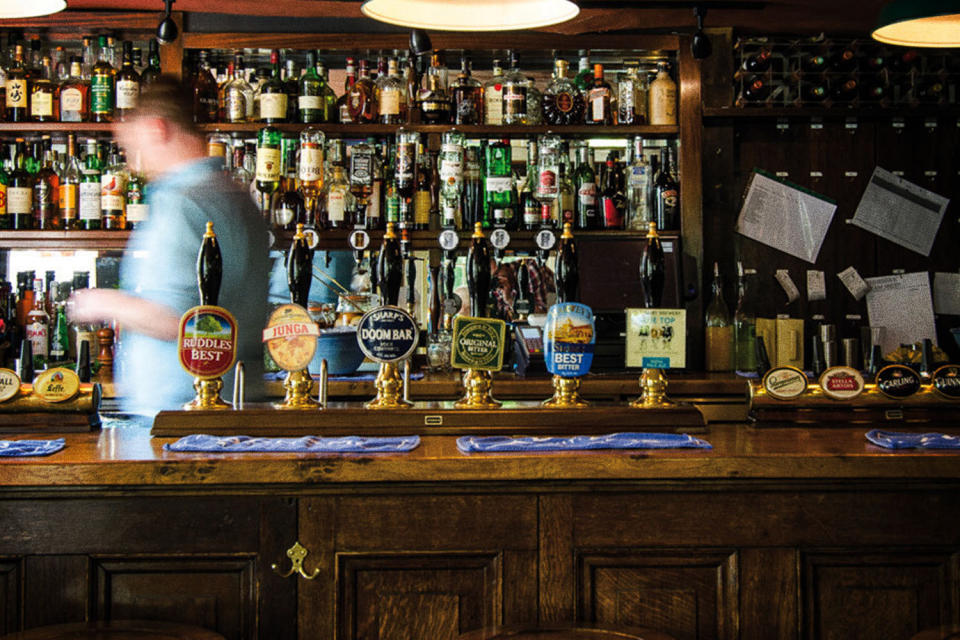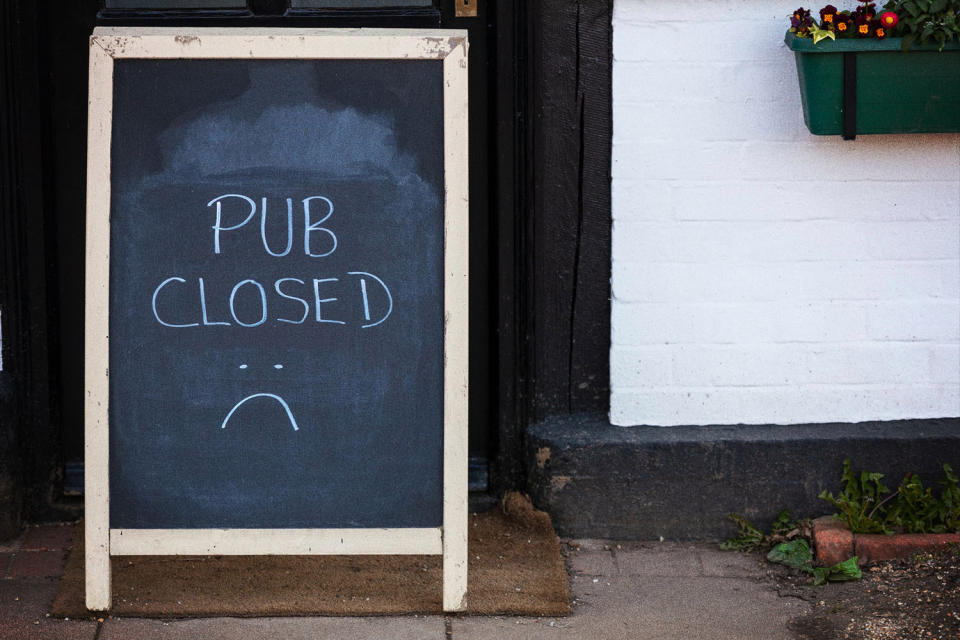Is the British Pub Really Dying?

Just before an Englishman dies, he sees a pub.
That’s what they say anyway: that on the edge of mortality, a cozy room with a fireplace, oak bar and a jovial, plump barman named Andy appears. With his Wessex accent and braised, earthy knuckles, he asks what he can do for you. The Englishman gulps his drink and brushes his mouth with his sleeve: “It wasn’t a bad run of things,” he mumbles to himself. Then nothing.
This fantasy probably owes to another tradition from British history, this one more macabre. Before prisoners were sent from the Tower of London to be executed, they spent their final moments in a pub. There’s a good one behind an old meat market in Smithfield, London, that advertises these sentiments proudly on its exterior. The Hand and Shears is a small place, and fittingly Dickensian. The bar room is dark and humid, with wide spaces and dusty antiques scattered about the floor. It’s far from the halcyon image, but close enough to the real thing.

I think this is the kind of pub many of us see when we close our eyes and picture one. A pub that resembles the real Britain, not the fantasy one. Centuries-old front rooms that have become more than a just a space to drink or eat. And they’re under threat.
An estimated 2,500 English pubs closed down in 2020. Like the famous eateries and bars of New York City or California, no institution is pandemic-proof.
A mile from the Hand and Shears is one of London’s most famous, The Eagle, which rose to prominence in the ‘90s. “Is the pub dying? It’s not having a good time. You can quote me on that!” Michael Belben, one of The Eagle’s founders, tells me. During our brief bit of freedom last summer, pubs could only operate on a reservation-basis, with tables separated a meter or so from one another. “We’re fine. But taking reservations at a pub kind of ruins the point of a pub,” he adds. Thankfully, following the PM’s recent announcement, they will re-open with outdoor service from today, Monday, April 12th. It’s a sigh of relief. But that doesn’t necessarily mean a return to normal.
You can’t just stroll in anymore like you used to. You cannot order from the bar. Landlords like Michael are having to hire waiters and waitresses for table service. Pubs were forced to transform into restaurants, and it’s likely they’ll remain this way after lockdown.
The pandemic isn’t entirely to blame. We’ve been having a conversation around the pub’s decline for a while, thanks to high taxation on beer and their new primary role as myopic restaurants, as well as competition from the corporate Pub Chains. COVID-19 has only exacerbated the problem.
So when did the pub’s decline start?
In the mid-to-late ‘90s, a new generation of homegrown chefs appeared on our televisions. We’d got it wrong about English cuisine, they said: it wasn’t brown, sludgy, unsophisticated, Sweeney Todd scurvy-inducing gruel. Rather, it had just been ignore for sexier foreign cuisines.

With our Scotch Eggs and Steak and Ale Pie redefined, pubs placed more emphasis on the kitchen than the bar. Some, like Tom Kerridge’s The Hand and Flowers, even became Michelin-star establishments. From the late-noughties, this movement became the new model for aspiring landlords.
What began as a metropolitan fad is now being done all over the country. When you drive into small hobnob villages, you encounter The Yewsbury, Oak and Acorn, the Thomas More Inn: rumpy-pumpy, ancient sanctuaries surrounded by England’s green and pleasant land. Their facades are thatched old-Albion with straw and piled slate. You anticipate Hobbits inside singing about dragons, or Morris dancing on large tables. Instead, you will find the copy-paste aesthetic of the modern gastropub: cafe furniture, art-deco lighting, a naked brick wall and a broadsheet menu with an impossible mix of Shepherd’s Pie, mozzarella platters and the chef’s special: often a soupy carrot puddle using last Sunday’s beef stock.
Is this the new face of Britain? And if Jerusalem was built here, as Blake suggests, who agreed on the contractor?
I’m angry because it happened to my local (a term of allegiance to a particular pub). This was where I had my first job at 12 years old, washing glasses, pots and pans, and where I snuck in half-pints of ale after a shift. Like anything truly alive, a good pub provides a balance: from solitude and friendship to the sudden flying pint-glass and hoorah of two drunks fighting before shaking hands and making up. When a friend visits from abroad, I always brought them here, so that they return home having had an authentic pub experience.
But just before the first lockdown, new Scandinavian furniture replaced the chipped wood stools and tables. Industrial lighting. A menu with “Chef’s specials” neatly propped on tables like leering pigeons in Trafalgar Square. A new landlord had recently bought the place. And after I inquired about the facelift, he replied, “we thought we’d update the place a bit.”
There’s a disconnect between the pub’s hyperlocal function and what landlords think is profitable. Pubs have landlords in the way cities have mayors. It’s his, but really it’s the community’s. He’s more of a steward or caretaker. Along the way, after all these centuries, there should be minor changes (improved plumbing is a good one). But it must always retain that inexplicable something that makes you long for its four walls when far from home. If you lose the essence of a pub, there is no shortage of fussy belligerents like myself who look elsewhere. Prices go up. And before long, that centuries-old establishment is gone forever.
Pubs are the true measure of a town or city. They provide us with a national litmus test. To have visited someone else’s local, far away, is to ascend into Man of Culture status, bragged about like a semester abroad: “Ah, Whitstable. Good town — don’t miss the Hammer and Bear.” “Burysford? Got worse over the years. The White Hart is awfully rough now. Take it from me.” Pubs are a real microcosm of provincial Britain, right up there with tourism sites and historic buildings. So why isn’t our government protecting them?

On average, three pubs a day close for good. According to Long Live the Local, who campaign on behalf of independent pubs, The UK has the highest beer tax rate of the top six brewing countries in the E.U. “It’s one of the highest in the world, with a rate three times the EU average, and 11 times that of Germany and Spain,” I’m told. Pubs are also forced to charge 20% VAT for food — making the gastropub an even more expensive option than other nearby restaurants, and provoking landlords to raise the price of beer.
It’s not all bad news. As of last month, the campaigners add, “Beer Duty has been frozen. [It’s a huge boost for the pub industry].” Emma McClarking of The British Beer and Pub Association suggests that the current chancellor “has made it clear he recognizes the vital role local pubs play in the communities,” and that, with £400 million in grants, “this will give them the best chance to get back on their feet.”
It’s a stretch to suggest the pandemic has been easy on pubs. But apart from financial support and frozen beer tax, it has sparked a new romanticism tied to the old “Keep Calm and Carry On” adage championing the resilient nature of Britain. This is something that transcends age, race, or sexuality. Pubs have always symbolized the relief at the end of a working day, and their reopening will mark the end of lockdown. These ancient rooms have seen us through the worst of times, from air raids and careless “updates” to — now — a nationwide pandemic.
And the majority live on, with each crisis reminding us why they really matter. We are circling too closely to their demise, though. The writer Hiaire Belloc understood this back in the 19th-century, warning that, “from the towns all inns are driven. Change your hearts or you will lose your inns, and you will have deserved to have lost them … But when you have lost your inns, drown your empty selves, for you will have lost the last of England.”
More Like This
For more travel news, tips and inspo, sign up for InsideHook's weekly travel newsletter, The Journey.
The post Is the British Pub Really Dying? appeared first on InsideHook.
The article Is the British Pub Really Dying? by Chris Cotonou was originally published on InsideHook.

